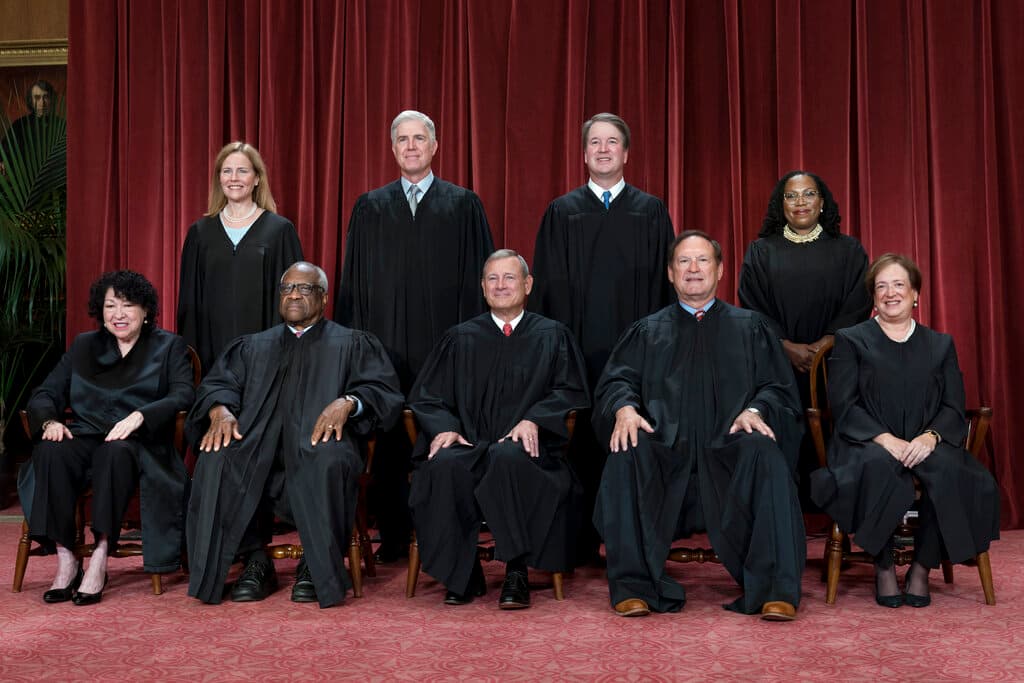Foiled Assassination Plot Against Justice Kavanaugh Shows How ‘Apocalypse Politics’ Is Putting Judges’ Lives at Risk
The case against the man charged with attempting to kill Justice Kavanaugh hangs in the balance after an update from attorneys on Friday.

Death threats, harassment, stalking: Are these types of violence against judges becoming the norm? “It’s part and parcel of American politics today,” a civil rights attorney who is a candidate for Fulton County judge, Robert Patillo, tells the Sun.
When Mr. Patillo, a civil rights attorney who recently announced he was running for a superior court seat against Judge Scott McAfee, the Republican who’s overseeing President Trump’s Georgia election interference case, “within 24 hours we had over 30 death threats against myself and my family.”
The threats stem from increasingly hostile politics that are often driven by “tribalism,” he says. “We’ve had people park outside of our house and honk the horn at 3 and 4 o’clock in the morning.
“We’ve received letters, voicemails, and text messages from people threatening us,” he adds. In some cases, when people don’t get their way, “they believe that they are justified in a violent reaction, because in their minds, the political system is illegitimate.”
It’s a problem that has extended across the judiciary, as threats to Supreme Court justices — and other federal judges — have escalated sharply. It’s the climate in which the case against Nicholas John Roske, charged with attempting to kill Justice Brett Kavanaugh, is hanging in the balance.
A status report filed Friday indicated that discussions about pretrial resolutions are “ongoing” and asks if a further update can be provided in late April. No trial date has been set in the nearly two years since Mr. Roske was charged with the attempted assassination.
That charge was laid after law enforcement found Mr. Roske near Justice Kavanaugh’s Virginia home equipped with a pistol, tactical gear, and a crow bar. Prosecutors allege that Mr. Roske wanted to kill Justice Kavanaugh because of disagreements about abortion and gun issues.
That lengthy timeline is standard in these types of cases, Mr. Patillo says, because they are “discovery-intensive.” They often include police reports and forensic investigations that look into the backgrounds of suspects.
“So that information generally takes multiple months even in just a state- or county-level investigation, let alone a federal investigation,” he says. The defendant also has rights to file motions to examine evidence or dismiss.
“We’ve seen a lot of this in many of the Trump cases, that they can use to push a trial out further and generally that’s used as a tactic to try to force a plea deal to take place,” Mr. Patillo says. The current judicial system incentivizes not going to trial, he adds, and some 90 percent of cases in America end in some form of pretrial resolution.
“For the defendant in this case, clearly, they would have preferred not to go to trial because the penalties could be anything from life imprisonment to a very long sentence and if they can negotiate a plea that will minimize that, of course they will prefer to take that,” he says.
For the government, there could be issues with evidence if the parties go to trial, he says, especially when it comes to the suspect’s intent and mental state. Those concerns “may incentivize them to move towards a plea deal instead of risking the risk of potentially losing a trial.”
The signals given by both parties indicate some form of pretrial resolution is likely to happen in the case, he adds.
As the justices have become, in Justice Samuel Alito’s words, “targets of assassination,” the court recently asked for $19.4 million in funding from Congress to expand Supreme Court Police’s “protective activities for justices.”
The federal judiciary also asked for an increase of nearly $40 million in funding that it says is “necessary to address the significant increase in threats against federal judges.” The United States Marshals Service has said that in 2015 there were 926 incidents of inappropriate threats made toward judges and court personnel — a number that spiked to 4,261 incidents in 2020, as the Sun has reported.
When it comes to the increasing threats against people in the judicial system, Mr. Patillo says society needs to work toward “tamping down” violent political rhetoric. “Everybody that you disagree with is not Hitler. Everybody that you disagree with is not a deep state communist. Sometimes you win. Sometimes you lose,” he says.
In the past five to 10 years there’s been a departure from winning and losing graciously, he adds. “Instead of that, we have a politics now where it’s almost apocalypse politics, where people think that they have to take these things into their own hands. We saw this on January 6, we saw this in Charlottesville,” he says. “We need political leadership who’s willing to really lower the temperature in American politics.”

